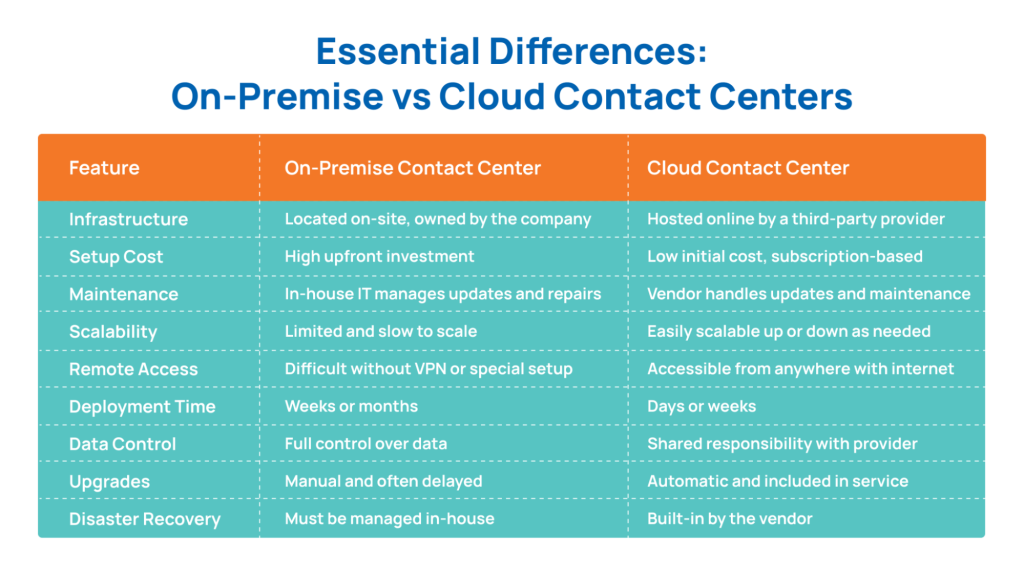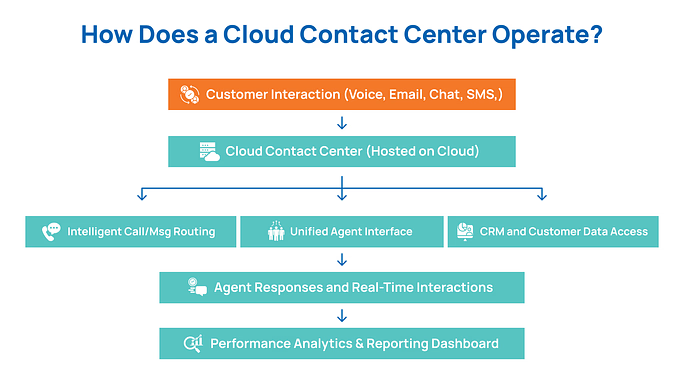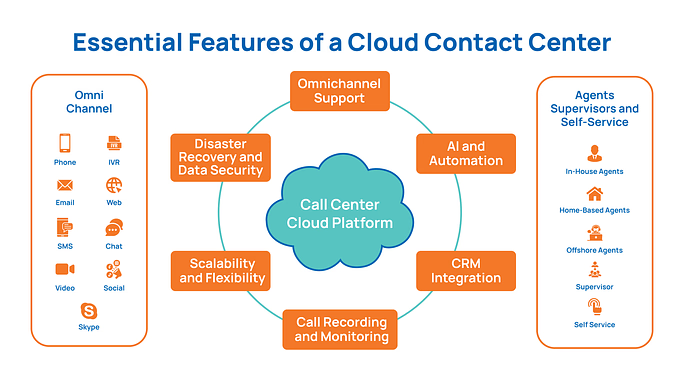In this Blog, You Will Learn:
|
What is a Cloud Contact Center: The Modern Standard for Customer Support
A cloud contact center is software that helps businesses manage customer communications using cloud technology. It allows customer service teams to handle both inbound (coming from customers) and outbound (initiated by the business) interactions across multiple channels, such as phone calls, emails, live chats, SMS, and social media platforms. Unlike regular systems, which require physical servers and phone lines installed on-site, a cloud contact center runs online. Teams can access the system from any location with an internet connection. There’s no need for physical hardware or local IT infrastructure, making supporting remote agents or distributed teams easier. The platform includes built-in tools for call management, customer history, and performance tracking, all available in one interface. This makes it easier for agents to work efficiently and provide consistent service, no matter how customers contact them.Essential Differences: On-Premise vs Cloud Contact Centers
An on-premise contact center is a regular setup where all the hardware, software, and infrastructure are physically located within your business premises. Your IT team manages everything from server maintenance to system upgrades.
How Does a Cloud Contact Center Operate?
 A cloud contact center operates entirely over the internet, without the need for physical telephony hardware like PBX systems. It uses cloud-based software to manage customer communications across various channels. Here is a breakdown of how it functions in a business environment:
A cloud contact center operates entirely over the internet, without the need for physical telephony hardware like PBX systems. It uses cloud-based software to manage customer communications across various channels. Here is a breakdown of how it functions in a business environment:
-
Internet-Based Access
-
Browser-Based Communication
-
Unified Interface for Multichannel Support
-
No On-Site Installation or Maintenance
-
Real-Time Interactions and Routing
-
Enhanced Agent Tools
-
Support for Remote Teams
-
Centralized Reporting and Analytics
Essential Features of a Cloud Contact Center
 Here are some of the essential features of a cloud contact center:
Here are some of the essential features of a cloud contact center:
-
Omnichannel Support
-
AI and Automation
-
CRM Integration
-
Call Recording and Monitoring
-
Scalability and Flexibility
-
Disaster Recovery and Data Security
Benefits of Moving to a Cloud Contact Center
Cloud contact centers offer modern, flexible, scalable solutions that outperform on-premise systems in nearly every area. Here are the top benefits businesses can expect:1. Lower Costs and Long-Term Savings
Cloud contact centers reduce upfront and ongoing expenses. There's no need for on-site servers, telephony hardware, or expensive IT support. Businesses save on infrastructure but also on real estate, maintenance, and system upgrades. Businesses often reduce communication costs by 50% to 75% after switching to VoIP. With many features built into a single platform, companies also reduce their reliance on multiple third-party apps and tools.2. Fast Setup and Easy Deployment
Setting up a cloud contact center takes days, weeks, ot months. No complex wiring or physical installations are required. Most configurations can be handled through an intuitive web interface. New agents can be onboarded quickly, and features like call routing, analytics, and permissions can be customized with just a few clicks. This makes cloud contact centers ideal for businesses that need agility and quick rollout. For example, a growing e-commerce brand launched its customer support center in under 10 days using a cloud platform, enabling them to onboard 20 agents and go live before peak season.3. High Performance and Reliability
Cloud platforms use virtual infrastructure that scales automatically based on demand. This ensures high availability, even during traffic spikes. Redundant cloud infrastructure offers better uptime and minimizes service interruptions. If Internet access is disrupted locally, calls can be redirected to mobile phones or other fallback systems. For instance, during a Black Friday surge, a retail call center handled a 3x increase in call volume without system lag with cloud auto-scaling and call redirection to mobile backups. With PerfectSoft.AI, you get 99.99% uptime and crystal-clear voice quality, so your team stays connected and your customers always hear you loud and clear.4. Increased Agent Productivity
Agents benefit from a unified interface that includes tools for handling all communication types: voice, chat, email, SMS, and more. Features like click-to-call, intelligent call routing, and AI-based self-service reduce handling time. Agents no longer need to juggle multiple systems, making workflows faster and easier to manage. This leads to quicker resolutions and more satisfied customers.5. Enhanced Security and Compliance
Cloud providers invest in enterprise-grade security. Most platforms include end-to-end encryption, access control, call logging, and audit trails. These features help businesses comply with regulations like PCI DSS, HIPAA, and GDPR, which is especially important for the finance, healthcare, and e-commerce sectors.6. Unified Customer Experience
All customer interactions are routed through a centralized system, regardless of the channel. This gives agents a full view of the customer’s history, preferences, and ongoing issues. This ensures consistent service across phone, chat, email, and social media and builds better customer relationships through personalized support. Customers get faster, more informed service, no matter how they reach out.7. Real-Time Insights and Analytics
Cloud platforms provide advanced analytics tools to help managers monitor operations. Customizable dashboards track KPIs like response time, resolution rate, and customer satisfaction. Real-time reporting helps identify performance gaps and improve team efficiency.8. Simplified Management
Administrative settings, such as user permissions, routing logic, and compliance controls, are managed through user-friendly web interfaces. There is no need to involve IT teams for every change. Managers can make updates instantly, even remotely. This reduces overhead and improves responsiveness to changing business needs. For example, an insurance call center with 50+ agents now instantly adjusts routing rules to prioritize urgent claims, with no downtime and just a few clicks in the admin panel.How to Choose the Right Cloud Contact Center Provider for Your Business?
To choose the right solution for your business, you must look beyond brand names and focus on what truly fits your goals, workflows, and long-term plans. Here's what to consider:1. Understand Your Business Needs
Start by identifying what your contact center must handle today and how that might change. Ask yourself:- What communication channels do we need? (Voice, chat, email, SMS, social media?)
- How many agents will be using the system?
- Do we require specific features like call recording, intelligent routing, or CRM integration?
2. Evaluate Core Features and Capabilities
Not all cloud contact centers offer the same functionality. Focus on features that directly support your team and improve customer experience. Look for:- Skills-based routing to connect customers with the right agents quickly
- Call recording and monitoring for quality control and training.
- Real-time dashboards for performance tracking
- CRM and app integrations to create a unified view of customer data
3. Consider Pricing and Scalability
Compare pricing models carefully. Some platforms charge per user, others per minute or by usage. Look for:- Transparent pricing with no hidden fees
- Plans that fit your current budget and can scale as your team grows
- Flexibility to add or remove agents, channels, and features without long delays
4. Check Security and Compliance Standards
You are responsible for protecting customer data. Choose a vendor that takes security seriously. Ensure they offer:- End-to-end encryption for calls and messages
- Secure user authentication and access controls
- Compliance with industry regulations like GDPR, HIPAA, or PCI DSS, depending on your sector.
5. Assess Vendor Support and Service Quality
Even the best technology needs reliable support. Check the vendors:- Customer support hours and response times
- Availability of onboarding assistance and agent training
- Resources like help centers, documentation, or live chat support
6. Match the Platform to Your Long-Term Goals
Finally, think beyond your immediate needs. Will this solution support you as your business grows? Will it integrate with new systems you may adopt later? Choose a vendor that meets your current requirements and can evolve with your operations.Connect Smarter and Scale Faster with PerfectSoft.AI’s Contact Center Solutions
 At PerfectSoft.AI, we create seamless, intelligent, high-performance contact center solutions to enhance customer satisfaction, agent engagement, and operational efficiency. Whether running a high-volume BPO, customer service team, or sales operation, our solutions empower you to connect across all channels while maintaining crystal-clear voice communication.
Our Solutions Include:
Telecom Voice Services – Ensure high-quality, secure, and reliable voice connections, advanced VoIP, and global reach.
Why Choose PerfectSoft.AI?
At PerfectSoft.AI, we create seamless, intelligent, high-performance contact center solutions to enhance customer satisfaction, agent engagement, and operational efficiency. Whether running a high-volume BPO, customer service team, or sales operation, our solutions empower you to connect across all channels while maintaining crystal-clear voice communication.
Our Solutions Include:
Telecom Voice Services – Ensure high-quality, secure, and reliable voice connections, advanced VoIP, and global reach.
Why Choose PerfectSoft.AI?
- Seamless Integration: Connect with your existing CRM and business tools.
- Cost-Effective Solutions: Optimize operations without breaking the bank.
- Scalability & Flexibility – Easily scale your contact center operations.
- 24/7 Support: Get personalized, round-the-clock assistance whenever you need it.


Comments